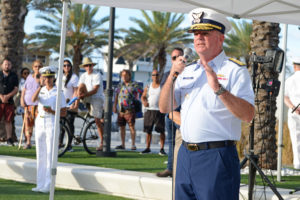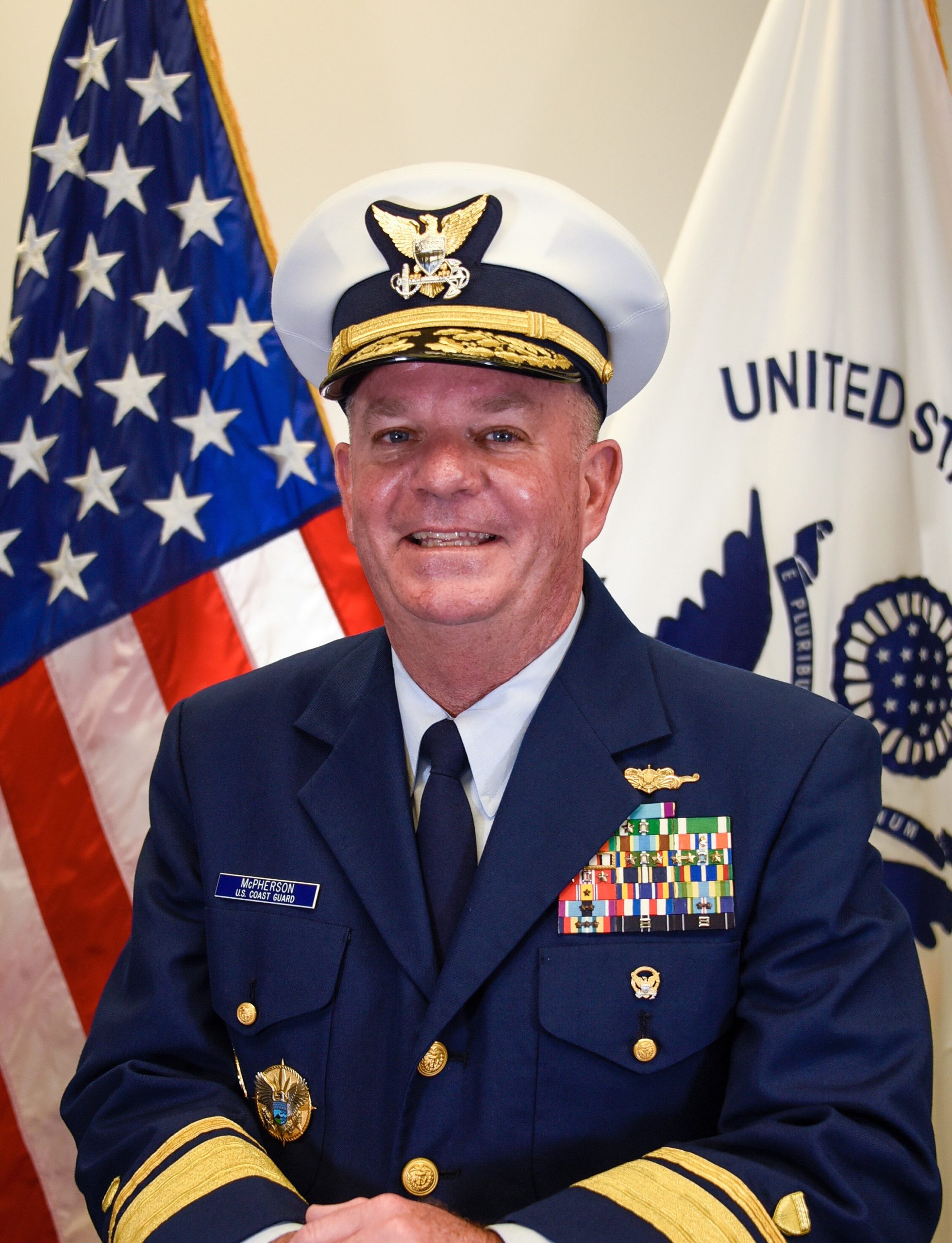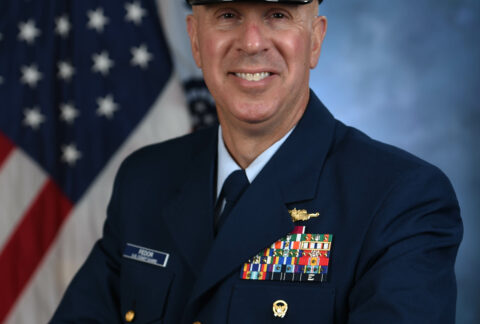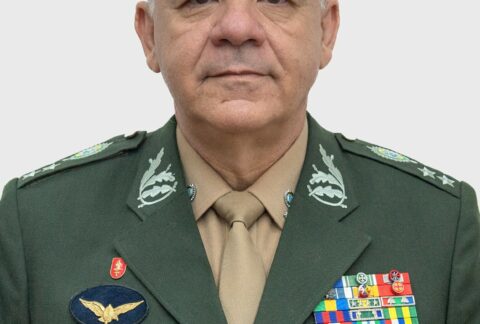As commander of the Seventh Coast Guard District, headquartered in Miami, Florida, Rear Admiral Brendan McPherson is responsible for all Coast Guard operations in the southeast United States and the Caribbean Basin, including Florida, Georgia, South Carolina, Puerto Rico, and the U.S. Virgin Islands. The Seventh District encompasses an area of 4.6 million square kilometers and shares operational borders with 34 nations and territories in the Western Hemisphere.
Rear Adm. McPherson recently sat with Diálogo to discuss counternarcotics operations; Illegal, Unreported, and Unregulated (IUU) fishing; cooperation with partner nations; and mass migration, among other topics; and how his career has come full circle. Following this interview, Rear Adm. McPherson joined the USCG Cutter Dauntless crew as they offloaded more than $243 million in illegal narcotics seized in the Caribbean Sea. The Dauntless was where he began his career as a young ensign in Miami Beach in 1989.

Diálogo: Since assuming command of District 7 in July 2021, what do you view as the biggest threats facing your area of responsibility?
USCG Rear Admiral Brendan McPherson, commander of the Seventh Coast Guard District: This is an interesting, dynamic operating area. We have relationships with 34 countries in the region and we come together to collectively address a whole range of threats from man in this area — natural disasters, hurricanes, earthquakes — and put in a lot of effort on countering drug smugglers, and migration. We have a lot of illegal migration. We have a lot of drug smuggling ventures in the area, and we’re also looking at illegal fishing as well. Beyond that, our focus is on making sure that we have a safe, secure, and prosperous maritime transportation system. Our nation relies on the maritime transportation system for our economic viability and so our coasts, our ports, our waterways are critically important. We’re looking at things like illegal charters that put people in jeopardy, as well as substandard shipping in the area, to make sure that our waterways are safe, secure, and clean.
Diálogo: What’s the relationship between the 7th district and partner nations in the region?
Rear Adm. McPherson: We have excellent relations with our partners in the region. We have bilateral agreements with just about all of the 34 nations that we deal with. But I think what’s unique is that the Coast Guard is a small organization in comparison to our DOD [U.S. Department of Defense] counterparts, but a lot of our authority, as both an armed force and also a law enforcement agency, looks a lot like our partner nations in the region. So, countries like Jamaica and Colombia and some of the eastern Caribbean nations, their military often has law enforcement authorities as well, and they also respond to natural disasters. I think we’re a good model for them and it’s a good fit and a good partnership; and we learn from them, and they can learn from us.
Diálogo: What has been the Coast Guard’s responsibility and in particular, District 7, in combatting IUU fishing?
Rear Adm. McPherson: The Coast Guard has a long history of making sure that fishermen act responsibly in accordance with our laws and regulations and international treaties, but we know that the threat of illegal, unreported, and unregulated fishing in the region is a growing threat. We’re working with our partner nations to determine what we can do to really focus our efforts on that. We have a strategy that we just recently released in the Coast Guard, which is focused on three things: One is to promote targeted intel driven operations where we suspect or know that this IUU fishing activity may be going on. The second is to encounter predatory and irresponsible state actors that may be supporting that — and we’ve got some significant concerns there with nations like China. And finally, expanding our multilateral fisheries enforcement cooperation, and that’s working with our partners in the region.
Diálogo: You assumed command of District 7 last year and were on the job no more than a month when the earthquake in Haiti happened. What was the 7th role during that period in providing assistance?
Rear Adm. McPherson: That was a shock, quite literally to all of us. But I was very pleased with the Coast Guard’s response, particularly the 7th District, in close coordination and cooperation with U.S. Southern Command. We operate in and around Haiti all the time with our ships and aircraft, so we were well positioned, and we have the authority to respond to task. And within 24 hours of the government of Haiti requesting assistance, we had helicopters on the ground; we had people on the ground. We were able to help save or assist over 350 people who needed immediate medical attention. And we also delivered more than 17 tons of disaster aid — we were able to get in there quickly.
Diálogo: How is the USCG contributing to the current counternarcotics fight?
Rear Adm. McPherson: We’re very focused on counternarcotics in the region. It creates instability and results in violence. And we work closely with our partners to exercise our bilateral agreements, focus on countering drugs. We do this in very close partnership with Joint Interagency Task Force South (JIATF-South) in Key West, a subcomponent to U.S. Southern Command, and that is probably the gold standard for interagency and international cooperation in planning for the detection and monitoring part of the mission as a law enforcement agency and a part of the armed forces. Our responsibility is on interdiction and apprehension. The way to think of it is: JIATF-South will find them, and then we will interdict them. And we do that as a joint force, working in close partnership with allies and neighbors like the United Kingdom, like Canada, like the Dutch, and all the partners that we have in the region like Colombia. In fact, last year [2021], I believe that more than 60 percent of sea interdictions were conducted by our partner nations. So, it’s a great relationship.
Diálogo: What has been the Coast Guard role during the implementation of Title 42?
Rear Adm. McPherson: As a federal law enforcement agency, we have the authority and the responsibility to conduct interdictions of illegal smuggling ventures at sea. We focus a lot of our efforts in doing that, but it’s about border security, and more importantly, it’s about saving lives. These smuggling ventures within the region are often aboard either unseaworthy or overloaded vessels, and our principal objective is to prevent the loss of life. Unfortunately, we’ve experienced over time that these can be deadly. And our effort is to interdict those vessels as close to their point of origin as possible and conduct timely repatriations that we know save lives.
Diálogo: If/when the law is repealed, will that change the way the Coast Guard addresses future migrants who travel by sea?
Rear Adm. McPherson: When it comes to Title 42, that really has no bearing on our operation in the maritime environment. Title 42 was an emergency order that was put in place by the CDC [Center for Disease Control] due to the pandemic along the southwest border, the land border. It did not apply to maritime interdiction. So regardless of what might happen with Title 42, we’re going to continue to conduct interdictions in the maritime domain. And people who do take to the sea can expect to be repatriated.
Diálogo: How have your previous assignments prepared you for your current position and what lessons learned have you applied as District 7 commander?
Rear Adm. McPherson: I’ve been fortunate enough to do more than 30 years of service in the Coast Guard. In fact, I started my career right here in Miami. I was an ensign, a junior officer aboard the Coast Guard Cutter Dauntless, which was homeported right here in Miami Beach. So here I am, 30 years later, back in Miami with the privilege and the honor to lead some of the 4,000 Coast Guard men and women within the Seventh District conducting this mission. There’s no place else I would rather be.









